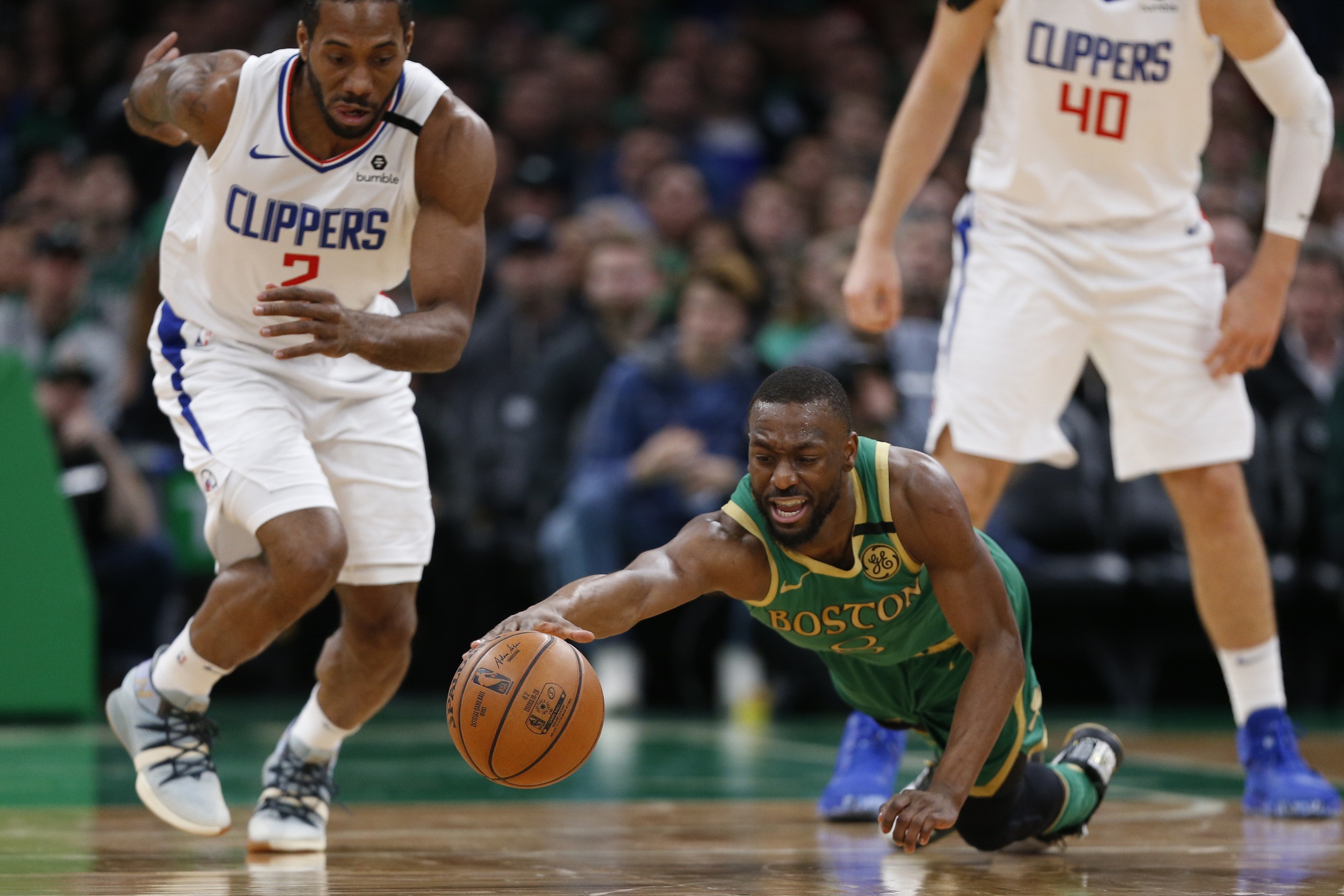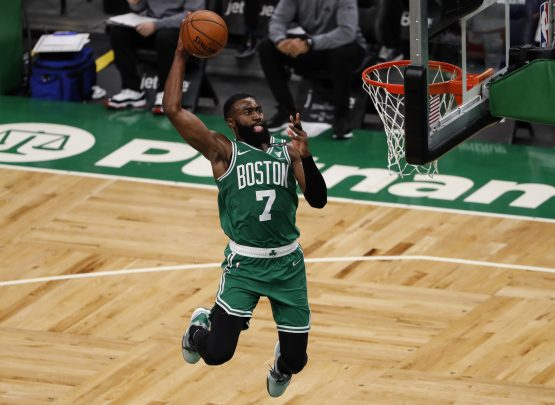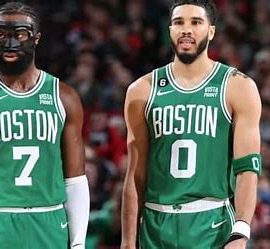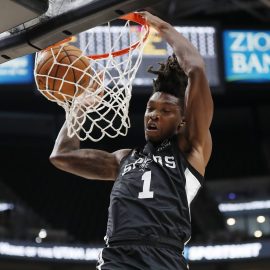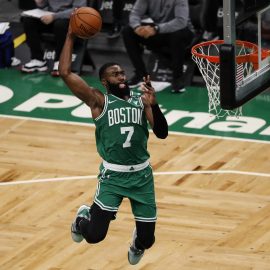Every morning, we compile the links of the day and dump them here… highlighting the big storyline. Because there’s nothing quite as satisfying as a good morning dump.
“It’s time to lock in even more,” said Walker as he paused amidst the work gear. “It’s time to get to … well, we’re going to get to the playoffs. It’s time to get there though and really just focus in. We’ve got to lock in. It’s about that time.”
The Celtics sit at 38-16, third in the Eastern Conference and just a loss-column game behind No. 2 Toronto. They have the fourth-best record in the NBA.
Not bad. But not enough.
“It’s been real, but now it’s definitely, definitely real,” said Walker. “We’ve got, what, 26 games left (28)? It’s go time.”
Although it hasn’t cropped up often, it’s been interesting watching the change in Kemba’s tone.
“Well, we’re going to get to the playoffs.” This is pretty much the first time in Kemba’s professional career where that’s been a given. And that’s gotta be nice for a player who put in his time for a sad-sack franchise that seems to exist primarily to enrich its owners while bringing the minimum possible enjoyment to its fans.
On Saturday, Mike’s morning dump had another interesting quote from Kemba:
I was averaging about 26 and a half (points per game) at the time. This year, like 21, something like that or whatever.
Look at the difference in Kemba’s awareness of his personal stats year-over-year. When he was playing for Charlotte, a team assembled to perpetually sit in the NBA’s horse latitudes, there was little to do but track personal stats. Lord knows if you spent too much time considering team stats like wins and losses, you’d have little to feel good about.
But what a difference a year makes. It’s not just that Kemba doesn’t know his scoring average, it’s that he actually said, “something like that or whatever.”
It’s one thing for a guy to say that he doesn’t care about his personal stats when asked a direct, on point question about them.
It’s another thing entirely for a guy to let slip a turn of phrase that indicates that he really doesn’t care about them.
This is exactly what you want to hear from a guy who by his age, talent and experience, is one of the team’s leaders.
I’m not worried about this team at all. Not a bit.
Page 2: Where the C’s have an interesting take on “player development”
Harvard graduate. Decorated college basketball player. A first-round draft pick.
There’s a lot to love about the resume of Allison Feaster, director of player development and personal growth for the Boston Celtics.
…
Celtics rookie Romeo Langford, the youngest member of the team at 20, admits he talks with Feaster often about an array of issues that as a rookie, are totally foreign to him.
She can connect with them on basketball-related matters having played professionally for more than a decade.
But she also can assist in helping them some semblance of balance off the court as well, suggesting classes they can take or other activities that they can involve themselves with in the community.
“Having her around is really important; it helps the transition,” Langford told NBC Sports Boston. “How to handle difficult situations. We [rookies] don’t know too much. Coming into the league, what to expect or what to do or where to turn. She’s that person who is there, for that, to make the transition a lot smoother.”
It’s rather interesting that the Celtics’ director of “player development” is tasked primarily with off-court development. Granted, there’s a bit of fluff in so many of these front office and support positions. “Director of operations” sounds really impressive, but then you realize that one of the operations directed is the team’s laundry.
However, Feaster is filling an important role.
So many of these guys, their dream from early childhood on is to make the NBA. And once they get there, there’s a lot about the league that is very different on the inside than it looks from the outside.
Take pay for instance. Sure, you’ve just signed a multi-million dollar rookie scale contract, but your agent is going to take 15% of that right off the bat.
Then there are jock taxes, the enforcement of state income tax laws in every jurisdiction where you play basketball. For you and me, if we earn a buck by doing work out of state, depending on the state, we may technically owe that state tax on the income we earn there, but in actuality, that state seldom if ever cares.
But they do care when guys are making more for playing a single game than most people earn in an entire year.
So that’s another chunk of your income that’s gone that you probably weren’t expecting when you were putting in hours practicing in an empty gym.
And then there’s the reality that yes, you did sign a multi-million dollar contract, but that doesn’t make you a millionaire. Not hardly. You don’t have a million dollars in the bank. But everybody you used to know thinks you do.
Also, it seems like working for the Celtics these days is a throwback to the best aspects of Red’s tenure, and even before that, Walter Brown’s views:
“The beauty of this position and this organization and the way that Kara [Lawson, Celtics assistant coach] and I have been welcomed, it’s been just like any other employee I imagine. I don’t feel like ‘the other’ as I felt abroad as the only American or the only English speaker. I don’t feel like ‘the other’ as maybe I felt as being the only African-American on my Harvard team.”
When the C’s drafted Chuck Cooper, Walter Brown said, “I don’t give a damn if he’s striped or plaid or polka dot, Boston takes Charles Cooper of Duquesne!”
That was Red’s attitude as well. At a certain point in time in the mid-60s, when Havlicek was still the team’s sixth man and after Tommy Heinsohn retired, the five best players on the Celtics were all African-American.
So Red started five black players.
It was the first time that had happened in the NBA, but Red didn’t care about that. What he cared about was putting the best five guys on the court.
And that was one of the secrets to Red’s success. At a time when other teams were concerned about factors that had nothing to do with winning, Red cared about winning and very little else.
While some may view the hiring of Feaster and Lawson as a sop to political correctness, an attempt to curry favor with minorities, it’s telling that Feaster feels like she was hired to do a job and not to make the photo section of the team’s media guide more colorful.
The rest of the links
MassLive: Boston Celtics’ Jayson Tatum is putting up huge numbers, has he made the leap to superstardom? | Tom Westerholm | Former Boston Celtics star Kyrie Irving elected a VP of NBA Players Association at Monday meeting (report)
NBC Sports: NBA Power Rankings: How things change after All-Star weekend
Add The Sports Daily to your Google News Feed!
